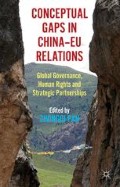Abstract
International norms have been playing an important role in world politics. International norms could be defined, in a simple way, as the rules of game or normative principles in international society that both enable and restrict state behaviour. They are closely linked to power, identity, values and national interest. As Peter Katzenstein argued, we can use “the concept of norms to describe collective expectations for the proper behavior of actors with a given identity. […] Norms thus either define (or constitute) identities or prescribe (or regulate) behavior, or they do both.”1
Access this chapter
Tax calculation will be finalised at checkout
Purchases are for personal use only
Preview
Unable to display preview. Download preview PDF.
Notes
Hedley Bull and Adam Watson, eds, Expansion of International Society, Oxford: Oxford University Press, 1984, pp. 1–9, 13–32, 117–26;
Adam Watson, The Evolution of International Society: A Comparative Historical Analysis, London: Routledge, 1992, pp. 135–309.
Gerald Chan, China’s Compliance in Global Affairs: Trade, Arms Control, Environmental Protection, Human Rights, Singapore: World Scientific Publishing, 2006, p. 64.
Anita Sengupta, Russia, China and Multilateralism in Central Asia, Delhi: Shipra Publication, 2005, p. 193.
Charles Grant with Katinka Barysch, Can Europe and China Share a New World Order? London: Center for European Reform, 2008, p. 1.
Ian Clark, “China and the United States: A Succession of Hegemonies?” International Affairs, vol. 87, no. 1, 2011, pp. 13–28.
Gustaaf Geeraerts, “China, the EU, and the New Multipolarity”, European Review, vol. 19, no. 1, 2011, pp. 57–67.
Wang Gungwu and Zheng Yongnian, eds, China and the New International Order, London: Routledge, 2008, p. 150.
Jiang Zemin, Jiang Zemin Lun You Zhongguo Tese De Shehui Zhuyi [Jiang Zemin on Socialism with Chinese Characteristics], Beijing: Zhongyang Wenxian Chubanshe [Central Documentary Press], 2002, p. 513.
David Shambaugh, Eberhard Sandschneider, and Zhou Hong, eds, China-Europe Relations: Perceptions, Policies and Prospects, London: Routledge, 2008, p. 109.
China Reform Forum, Zhong Mei Ou San Bian Guanxi Yanjiu [On China-US-Europe Trilateral Relations], Beijing: Zhongyang Dangxiao Chubanshe [Central Party School Press], 2009, pp. 88–9.
Xinning Song, “European ‘Models’ and Their Implications to China: Internal and External Perspectives”, Review of International Studies, vol. 36, 2010, pp. 755–75.
David Baldwin, ed., Neorealism and Neoliberalism: The Contemporary Debate, New York: Columbia University Press, 1993, p. 5.
Bart Gaens, ed., Europe-Asia Interregional Relations: A Decade of ASEM, Hampshire: Ashgate, 2008, p. 4.
Zhou Hong, ed., Oumeng Shi Zenyang De Liliang [European Union as a Power], Beijing: Shehui Kexue Wenxian Chubanshe [Social Sciences Academic Press], 2008, p. 51.
Shaun Breslin, “Comparative Theory, China, and the Future of East Asian Regionalism(s)”, Review of International Studies, vol. 36, 2010, pp. 709–29.
Lu Jianren, Yatai Jinghe Zuzhi yu zhongguo [APEC and China], Beijing: Jingji Guanli Chubanshe [Economic Administration Press], 1997, pp. 157–67.
Editor information
Editors and Affiliations
Copyright information
© 2012 Xiaoming Zhang
About this chapter
Cite this chapter
Zhang, X. (2012). Multipolarity and Multilateralism as International Norms: The Chinese and European Perspectives. In: Pan, Z. (eds) Conceptual Gaps in China-EU Relations. Palgrave Macmillan, London. https://doi.org/10.1057/9781137027443_12
Download citation
DOI: https://doi.org/10.1057/9781137027443_12
Publisher Name: Palgrave Macmillan, London
Print ISBN: 978-1-349-43959-1
Online ISBN: 978-1-137-02744-3
eBook Packages: Palgrave Political & Intern. Studies CollectionPolitical Science and International Studies (R0)

